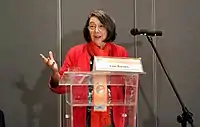
Line Bareiro (born 1950) is a Paraguayan political scientist, civil rights activist and feminist.[1]
Life
Line Bareiro studied at the University of Heidelberg in Germany, gaining a Masters in political science in 1979 and working as a research assistant to Dieter Nohlen. Returning to Paraguay she worked with the NGO Paraguayo de Datos (BPD) until its suppression by Alfredo Stroessner in 1982. She was a founder member of the Centro de Documentación e Estudios in 1985, and active in the women's movement Coordinación de Mujeres del Paraguay (CMP), founded in 1987. After Stroessner's overthrow in 1989, she was a founder member of Decidamos, a citizen advocacy group of NGOs.[1]
In 2010 Bareiro was elected to the UN's Committee on the Elimination of Discrimination against Women (CEDAW), to serve on the committee from 2011 until 2014.[1]
Works
- (ed. with Clyde Soto & Mary Monte) Alquimistas: documentos para otra historia de las mujeres, 1993
- (ed. with Ticio Escobar & Saúl Sosnowski) Hacia una cultura para la democracia en el Paraguay, 1994
- (ed. with Celsa Vega) Campesinas frente a la pobreza : condiciones de vida de las familias organizadas de la Cordillera, 1994
- (ed. with Clyde Soto) Ciudadanas: una memoria inconstante, 1997
- (ed.) El costo de la libertad : asesinato y heridas en el marzo paraguayo, 1999
- (with Clyde Soto) Women. In Peter Lambert & Andrew Nickson, The Transition to Democracy in Paraguay, Springer, pp. 87–.
References
- 1 2 3 R. Andrew Nickson (2015). "Bareiro, Line (1950–)". Historical Dictionary of Paraguay. Rowman & Littlefield Publishers. p. 81. ISBN 978-0-8108-7964-5.